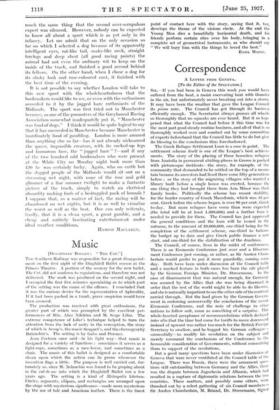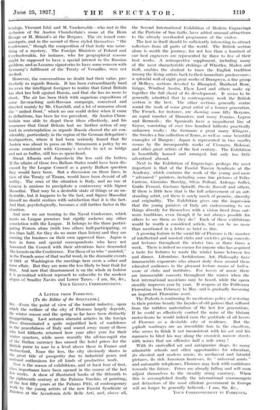Correspondence
A LETTER FROM GENEVA.
[To the Editor of the SPECTATOR.] SIR,—If you had been in Geneva this week you would have suffered from the heat, a moist enervating heat with thunder in the air, but unfortunately never breaking out into a storm. It may have been the weather that gave the League Conned its piano note. The Council has got through its business efficiently enough. The Secretariat always greases all wheels so thoroughly that no squeaks are ever heard. But it so hap- pened that what the Council had before it this time was for the most part good steady routine business, and all of that is so thoroughly worked over and combed out by some committee of experts beforehand that the Council has little to do but give its blessing to the conclusions thus foreshadowed.
The Greek Refugee Settlement Loan is a case in point. The settlement scheme itself is one of the League's best achieve- ments. The story of the placing of these homeless refugees from Anatolia in permanent abiding-places in Greece is packed with picturesque incidents--the story, for example, of the community that demanded to be settled on the top of a moun- tain because its ancestors had lived there some fifty generations before ; or the story of the migrating villagers who wanted a library built before a single house was erected, because the one thing they had brought there from Asia Minor was their family books. Politically the scheme has meant stability, for the border country of Greek Macedonia, which was 43 per cent. Greek before the scheme began, is over 90 per cent. Greek to-day. But more refugees have come than were expected (the total will be at least 1,300,000) and a further loan is needed to provide for them. The Council has just approved the general conditions and • the loan will be issued in the autumn, to the amount of £9,000,000, one-third being for the completion of the settlement scheme, one-third to balance the budget up to date and give Greek public finance a new start, and one-third for the stabilization of the drachma.
The Council, of course, lives in the midst of conferences. There is an Economic Conference just over and a Disarma- ment Conference just coming, or rather, as Sir Austen Cham- berlain would prefer to put it more guardedly, coming sonic day. Both have been under discussion at the Council table and a marked feature in both cases has been the role played by the German Foreign Minister, Dr. Stresemann. In the case of disarmament that was natural enough, for Germany was assured by the Allies that she was being disarmed in order that the rest of the world might be able to do likewise, and she is naturally impatient to see the other side of the contract carried through. But the lead given by the German Govern- ment in endorsing unreservedly the conclusions of the recent Economic Conference, and the note of challenge to other nations to follow suit, came as something of a surprise. This whole-hearted acceptance of recommendations which declared inter alia that the time had come for tariffs to move downward instead of upward was rather too much for the British Foreign Secretary to swallow, and he begged his German colleague- successfully—to modify his resolution on the subject and merely commend the conclusions of the Conference to the favourable consideration of Governments, without committing them to support of the resolutions. But a good many questions have been under discussion at Geneva that were never ventilated at the Council table of the League. There was Russia, there were the armament ques- tions still outstanding between Germany and the Allies, there was the dispute between Jugoslavia and Albania, which had resulted in a rupture of diplomatic relations between the two countries. These matters, and possibly some others, were thrashed out by a select gathering of six Council members-- Sir Austen Chamberlain, M. Briand, Dr. Stresemann, Signor Scialoja, Viscount Ishii and M. Vandervelde—who met in the seclusion of Sir Austen Chamberlain's room, at the Beau
ilivage or M. Briand's at the Bergues. The six issued corn- munique.s, and in the second of these styled themselves "the Conference," though the composition of that body was some- thing of a mystery. The Foreign Ministers of Poland and Czechoslovakia, for instance, who for geographical reasons might be supposed to have a special interest in the Russian problem, and as Loearno signatories to have some concern with Germany's fulfilment of the Treaty of Versailles, were not invited.
However, the conversations no doubt had their value, par- ticularly as regards Russia. It has been extraordinarily hard for even the intelligent foreigner to realize that Great Britain has shot her bolt against Russia, and that she has no more to shoot. The air has been thick with sagacious expositions of some far-reaching anti-Russian campaign, conceived and directed mainly by Mr. Churchill, and a lot of nonsense about the " united front," which. no one could define when it came to definitions, has-been far too prevalent. Sir Austen Cham- berlain was able to dispel these ideas effectively, and his assurance that Great Britain had no further action of any kind in contemplation as regards Russia cleared the air con- siderably, particularly in the region of the German delegation's headquarters, where it had been seriously feared that Sir Austen was about to press on Dr. Stresemann a policy by no means consistent with Germany's resolve to act as bridge and not as buffer, still less as spear-head.
About Albania and Jugoslavia the less said the better. If the affairs of those two Balkan States could have been dis- cussed by the League Council as a .purely Balkan question they would. have been. But a discussion on those lines, in view of the Treaty of Tirana, would have been devoid of all reality. The crux of the situation is Italy, and no one at Geneva is anxious to precipitate a controversy with Signor Mussolini. That may be a desirable state of things or an un- desirable, but it happens to be the fact, and Signor Mussolini himself no doubt realizes with satisfaction that it is the fact. And that, psychologically, becomes a still further factor in the situation. .
And now we are turning to the Naval Conference, which meets on League premises but rigidly eschews any other association with the League. It .belongs to the three partici- pating Powers alone (with two others half-participating, or less than half, for they do no more than listen) and they arc running the business on their own approved lines. Japan is here in force and special correspondents who have not honoured the Council with their attentions have descended like locusts on the Conference. For those of us who " assisted," in the French sense of that useful word, in the dramatic events of 1921 at Washington the meetings here seem a sober and tame affair. But they are none the less likely to bear fruit for that. And now that disarmament is on the whole in fashion it is permitted without reproach to subscribe to the modern slogan of Smaller Navies and Lower Taxes.—T am, Sir, &c.,
YOUR GENEVA CORRESPONDENT.















































 Previous page
Previous page